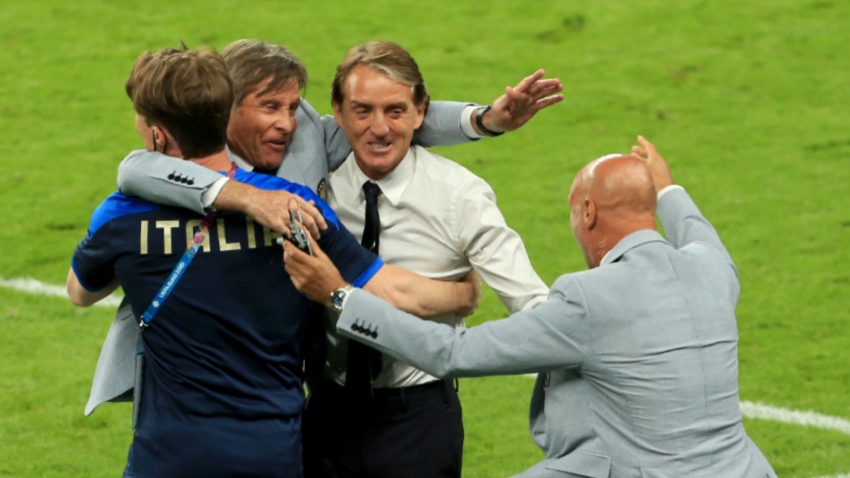For a moment it looked as though we were about to say goodbye to the outstanding team of the Euro 2020 group stage as early as the round-of-16.
But VAR came to the rescue in denying Marko Arnautovic a famous goal and, from then on, you just had the feeling fate was on Italy's side.
Roberto Mancini's Azzurri were aiming to extend their unbeaten run to 31 matches, setting a new record, and while Austria certainly went for it towards the end as they pulled one back through Sasa Kalajdzic, Italy saw out a historic 2-1 victory.
But where there was unrelenting praise before, there were arguably doubts about Italy and their system for the first time in Euro 2020, with Mancini forced to turn to his bench to get the job done in extra-time.
It should be said, for long periods they were dominant in the first half at Wembley, with their 12 shots the second-most Italy have managed in the opening 45 minutes of games at the tournament.
But there was unquestionably something missing, with Austria shrewdly set up by Franco Foda.
The German coach has proven tactically flexible in Euro 2020, switching between a back three and a back four – he chose the latter on this occasion as they zoned in on Italy's threat from the flanks.
David Alaba had been deployed at centre-back against the Netherlands but moved to left-back in the 1-0 win over Ukraine, and that was where he remained here.
Foda went with a double pivot again, giving the centre-backs extra protection but also ensuring Domenico Berardi and Lorenzo Insigne had little joy when cutting in from their respective wings, finding themselves crowded out more often than not by Florian Grillitsch and Xaver Schlager, whose five tackles were more than anyone else.
It became a recurring theme, with the only Italy player who looked even moderately threatening out wide for much of the game being Leonardo Spinazzola.
The left-back was bright in the opening 45 minutes, making some lung-busting runs up the flank and one of those led to arguably their best chance, when Nicolo Barella was denied by Daniel Bachmann. Nevertheless, he too was rather quieter after half-time.
Italy's struggles out wide were further highlighted by the fact they failed to deliver any open-play crosses before the break for the first time in a Euros game since 1980.
This was made even more surprising given 74.2 per cent of their attacks in the group stage came down the flanks. While an attack from the wings doesn't necessarily mean a cross has to be played in, it does suggest Foda was wise to focus his attentions on this area of the pitch.
Italy also weren't helped by the fact Giovanni Di Lorenzo offered very little by way of support to Berardi, who was a source of frustration well into the second period.
That was with the exception of one moment very early on in the second half, as Berardi got to the byline and drilled a low ball into the danger zone, much in the same vein as his assist for Manuel Locatelli against Turkey.
This time a team-mate couldn't get it into the goal, but instead of that acting as a source of encouragement, it was a tactic Berardi was barely able to carry out again.
Berardi's performance was summed up by his scissor-kick attempt in the 84th minute that was sliced high and wide. It was a final action befitting his underwhelming performance before being replaced by Federico Chiesa.
It was something of a surprise on matchday one when Berardi was the chosen man ahead of Chiesa out on the right. While the former justified that call in his first few games, the Juventus talent impressively staked his own claim here.
Five minutes into extra-time, Chiesa had hung out wide before springing into the box to receive a lofted pass from Spinazzola. He controlled it with his head, before cleverly knocking it underneath the approaching Konrad Laimer and smashing into the far side of the goal with a vengeance.
Another substitute in Matteo Pessina then got the goal that proved decisive, making the most of good hold-up play by Francesco Acerbi and powering home.
While Pessina's initial introduction for Marco Verratti, who had been key for Italy beforehand, raised eyebrows, Mancini's decision was ultimately vindicated in that moment.
Kalajdzic's late header saw him become the first player to score against Italy since Donny van de Beek for the Netherlands last October, but it could not prevent Italy from marching on to the quarter-finals.
On a day that saw Italy create history, with their unbeaten run as much to do with Mancini as any player such has been the transformative impact he's had, it was only fitting that his in-game changes made the difference.

































